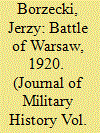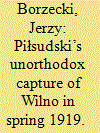| Srl | Item |
| 1 |
ID:
153759


|
|
|
|
|
| Summary/Abstract |
The Battle of Warsaw decided the outcome of the Polish-Soviet War of 1919–1920. The Red Army suffered what Lenin called a “catastrophic” and “unheard-of defeat.” Historians have often found it difficult to explain the astonishing Polish victory—the “Miracle on the Vistula.” The latest English-language literature on the topic is confusing. Ian Johnson asserts the battle was won thanks to the cracking of Soviet ciphers by the Polish radio-intelligence service. Adam Zamoyski does not even mention radio-intelligence as a factor. This article resolves the problem by looking at the recent Polish literature on the subject.
|
|
|
|
|
|
|
|
|
|
|
|
|
|
|
|
| 2 |
ID:
170924


|
|
|
|
|
| Summary/Abstract |
The establishment of the Soviet Union was unplanned and unexpected. Originally, Vladimir Lenin formed a two-stage plan – Sovietise Ukraine and Belarus as ostensibly independent states, then merge them into Soviet Russia as autonomous units. Local Bolsheviks initially supported this plan. However, to counteract foreign, mainly Polish, support for the émigré Ukrainian and Belarusian People’s republics, Moscow decided in early 1920 to postpone the planned merger indefinitely, granting the two Soviet republics some attributes of formal independence. The fallout from the Soviet-Polish peace process of 1920–1921 then compounded the effect of these measures on local Bolsheviks. As a result, the republics started to appreciate independence. By 1922, they attempted to act independently, even in foreign policy, which Moscow could hardly tolerate. Yet, local Bolsheviks vehemently opposed Joseph Stalin’s proposal to remedy the situation by proceeding with the long-delayed merger. Fearing that a forcible union might result in an irreparable rift between Moscow and the republics, Lenin decided to change his original plan and establish the Soviet Union. It was a compromise formula, where the republics retained their ostensible independence and the Centre exercised unquestioned authority.
|
|
|
|
|
|
|
|
|
|
|
|
|
|
|
|
| 3 |
ID:
148994


|
|
|
|
|
| Summary/Abstract |
There is much confusion on the issue of when the Polish-Soviet war broke out. Various authors hold that the war started anywhere between late 1918 and early 1920. It is arguable, though, that from a Polish perspective the war began with the January 1919 Soviet attack on the city of Wilno (Vilnius), defended by its Polish inhabitants. Since Poles widely believed the Wilno region to be a part of Polish national territory, the government in Warsaw felt it had little choice but to treat the attack as a casus belli.
|
|
|
|
|
|
|
|
|
|
|
|
|
|
|
|
| 4 |
ID:
137556


|
|
|
|
|
| Summary/Abstract |
ontrary to what some authors assert, the idea of ‘liberating’ Wilno from the Soviets did have the support of Polish political and military circles. What evoked reservations was merely Piłsudski’s execution of this idea. His Wilno operation was controversial from a military standpoint and its timing questionable, politically and militarily. It put Poland and its leader at significant risk. While ultimately Piłsudski was vindicated by a brilliant victory, it resulted in no small measure from good fortune.
|
|
|
|
|
|
|
|
|
|
|
|
|
|
|
|